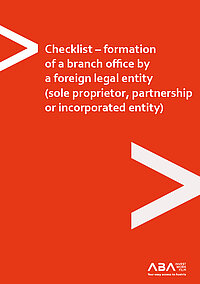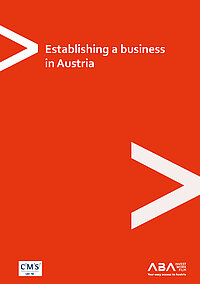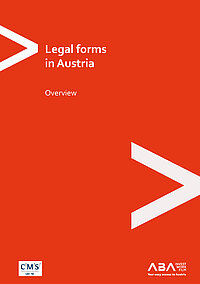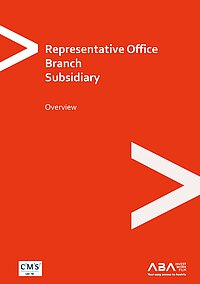Doing Business Starting a Business in Austria
Overview
Do you want to be self-employed? Do you prefer to be your own boss and invest your time in your passion? Do you want to build an Austrian business?
Then it's time to take the step towards self-employment and start your own company. In Austria, any individual or international corporation can establish a GmbH (limited liability company) without any Austrian investment partner.
If you have any questions about starting your business in Austria we are happy to help you.
The GmbH offers other benefits like:
- Limitation of the liability of shareholders to the total share capital,
- The ability to establish a GmbH as a single person and simultaneously serve as the managing director;
- Less formalities and administrative work compared to a public limited company (AG).
How to establish a company
(GmbH) in Austria
STEP 0 Preparation
- Contact your legal advisor to draft the articles of association.
- Clarify the company's registered office, name, and the managing director, and determine the scope of activities for your GmbH.
- Create a business plan, which serves as a guide for establishing your company and can significantly reduce entrepreneurial risk.
- Contact an Austrian bank to prepare for account opening.
- In Austria, a wide range of funding funding ()is available for your project when founding a company.
STEP 1 Articles of Association and Share Capital
- To establish your GmbH, notarially certified articles of association are required (for single-person companies, this is a declaration of establishment).
- The minimum share capital is 10.000 with at least 5,000 Euros to be paid in cash.
STEP 2 Entry into the Commercial Register
- You need to fill out the application form, then have it notarized and signed by the management.
Required documents:
- Notarized articles of association
- Resolution on the appointment of the management (which is not required if already included in the articles of association)
- Notarized sample declaration of signature of the management
- Proof of the payment of the cash contribution, declaration of all managing directors
The application for registration is submitted directly to the Commercial Register Court.
STEP 3 Business registration
- As a rule, an Austrian business license for economic activities is required.
- There are licensed, regulated and free trades. Whereas you only need to be over the age of 18 to carry out a free trade and show the criminal record certificate, the other types of professions also require proof of qualifications and/or experience.
- If you do not have the necessary qualifications or do not have a work permit for Austria, you can also recruit a "managing director under trade law" for at least 20 hours a week.
- INVEST in AUSTRIAINVEST in AUSTRIA () will inform you about the required business registration for your planned activities like in Austria.
STEP 4 Registration with the tax office, registering your employees, reports to the AustrianCentral Bank
- As a limited liability company (GmbH), you are subject to the corporate tax and value added tax. You require a tax number for this purpose as well as a VAT identification number. You or your tax adviser can request this after your company has been entered in the Commercial Register.
- Do you have employees? You need to register them with the responsible social insurance institution before their first day of employment. This is usually done for you by your tax adviser.
- Cross-border capital transactions (for example direct investments) must be reported to the OesterreichischeNationalbank(OeNB)for statistical reasons.
All the necessary information can be found on the OeNB websiteOeNB website ().
- Cross-border capital transactions (for example direct investments) must be reported to the OesterreichischeNationalbank(OeNB)for statistical reasons.
A branch office in Austria, being non-independent, is not a separate legal entity.
The legal obligations and liability remain with the foreign company. No minimum share capital is required, no shareholder meetings have to be held and no balance sheets must be published. However, the branch office must implement separate accounting.
The articles of association of the foreign company, translated into German, if necessary, have to be presented in order for the branch office to be entered into the Commercial Register. Each year the balance sheet of the foreign company, also translated into German, has to be submitted to the Commercial Court.
Any questions about establishing a branch office in Austria?
As experienced experts with an excellent knowledge of the market, we are at your disposal to assist you with every step involved in setting up your company in Austria, and we will link you to the experts you need.
How to set up a branch office in Austria
STEP 1 Resolution on establishing the branch office
- The name of the company must include that of the foreign company.
- Registration of the branch office in the Austrian Commercial Register.
-
A company without a registered office in the EU/EEA must appoint a "permanent representative" whose residence is in Austria.”
-
STEP 2 Entry into the Commercial Register
- Application is submitted to the Commercial Court.
- Entry into the Commercial Register with the certified signature by the management of the foreign company in the number authorised to represent the company.
- Current articles of association or articles of incorporation of the foreign company as a certified copy and, if necessary, a certified translation.
- Resolution by the foreign company regarding the setting up of the branch office in Austria.
- Proof of the legal existence of the foreign company (e.g., certified extract from the Commercial Register).
- Certified declarations of sample signatures of all managing directors of the foreign company and, if applicable, the representative in Austria.
- Proof of the regular business activity in the home country (not necessary for companies based in the EU).
- Confirmation of the actual setting up of the branch office (e.g. by the Austrian Federal Economic Chamber, rental contract).
STEP 3 Business registration
- A registration of the business is usually required to enable a company to carry out business operations in Austria.
- There are licensed, regulated and free trades. Whereas you only need to be over the age of 18 to carry out a free trade and provide the criminal record certificate, the other types of professions also require proof of qualifications and/or experience. Tip: If you do not have the necessary qualifications or do not have a work permit for Austria, you can also recruit a "managing director under trade law" for at least 20 hours a week.
- Online-Registration of the trade via the Austrian Trade Information SystemAustrian Trade Information System ().
STEP 4 Registration with the tax office and registration of employees
- A tax number is required for an Austrian branch office.
- The profits generated by the branch office are taxed in Austria.
- If you have employees, you need to register them with the responsible social insurance institution before their first day of employment. This is usually done for you by your tax adviser.
Flexible Company (FlexCo)
This company form is primarily intended to meet the special needs of start-ups. The legal form can be seen as a mixture between a LLC (GmbH) and an JSCo (AG).
You can read about the advantages and features of FlexCo in our articles "Austria introduces new company form for startupsAustria introduces new company form for startups ()" and "Startup package: FlexCoStartup package: FlexCo () and employee participation regime. and employee participation regime. ()"
Tips for your successful start in the Austrian business environment
Are you looking to expand in Austria? With a location in Austria, you not only open up new markets but also build networks in the heart of Europe and secure valuable know-how from Austrian stakeholders for your business. We support you in the preparation of your next entrepreneurial step – with the best tips for establishing your company in Austria.
- 01
Tip 1: Get an overview of the market
A good market overview concentrates on key factors i.e., market size and potential, market trends and in particular a detailed analysis of the competition. Other important questions that should be taken into account include wage costs, real estate prices, operating expenses, industry clusters, availability of skilled workers and funding options. The experienced team at ABA - INVEST in AUSTRIA will support you on all relevant matters.
- 02
Tip 2: Develop a strategy and business plan
A company making the move into the Austrian market need more than just a good product and the desire for business growth. A business plan is also an essential tool for a successful undertaking and offers the opportunity to convince potential investors. The basis is specifically considering which business activities are planned in the new business location and to what extent. What is done at headquarters in the country of origin and what will be done in the new foreign subsidiary? How are sales, production, marketing as well as research and development structured? Our advice is for you to consider your expansion to Austria as a project similar to establishing a new company.
- 03
Tip 3: Clarify the Austrian tax conditions
Companies that operate in Austria are subject to a uniform corporate tax. This tax has been reduced to 23% by 2024. Other tax burdens which normally exist in other countries such as the trade tax, property tax or inheritance tax are not levied in Austria.
- 04
Tip 4: Choose the location in Austria carefully
Austria has a total of nine federal states specialising in different sectors. INVEST in AUSTRIA will help you find the right location and support you in the search in cooperation with the regional investment promotion agencies.
- 05
Tip 5: Ensure expert advice
Establish contact with key stakeholders in a timely manner before implementing your expansion project and seek advice only from experts. Their specialised know-how should encompass not only Austria but your country of origin as well. There is a specialised terminology in each country, for example when it comes to administrative law. It would be better to check things once more! INVEST in AUSTRIA will be happy to support you by providing the right contacts.
- 06
Tip 6: Make use of Austrian e-Government services
Austria offers companies the Business Service PortalBusiness Service Portal (), namely a possibility to simply have administrative steps processed online. Accordingly, you can not only establish a company online but also fill out digital forms, move to a new location and handle financial matters. You can register and use the portal at no cost.
Our Services
ABA simply gets it done - for you!
As experienced experts with an excellent knowledge of the market, we are at your disposal to assist you with every step involved in setting up your company in Austria, and we will link you to the experts you need.
Checklists for Starting a Business
Everything at a glance: With these checklists, you won't miss any important points on the path towards establishing your business in Austria.

Checklist for establishing a limited liability company (GmbH) or FlexCo

Checklist for establishing a branch office
All the steps required to launch your branch office
Downloads for Starting a Business
Find here worth knowing and useful information about starting a business.
For detailed information please contactcontact () us directly!

Starting Business

Tax Aspects

Overview Legal Forms
